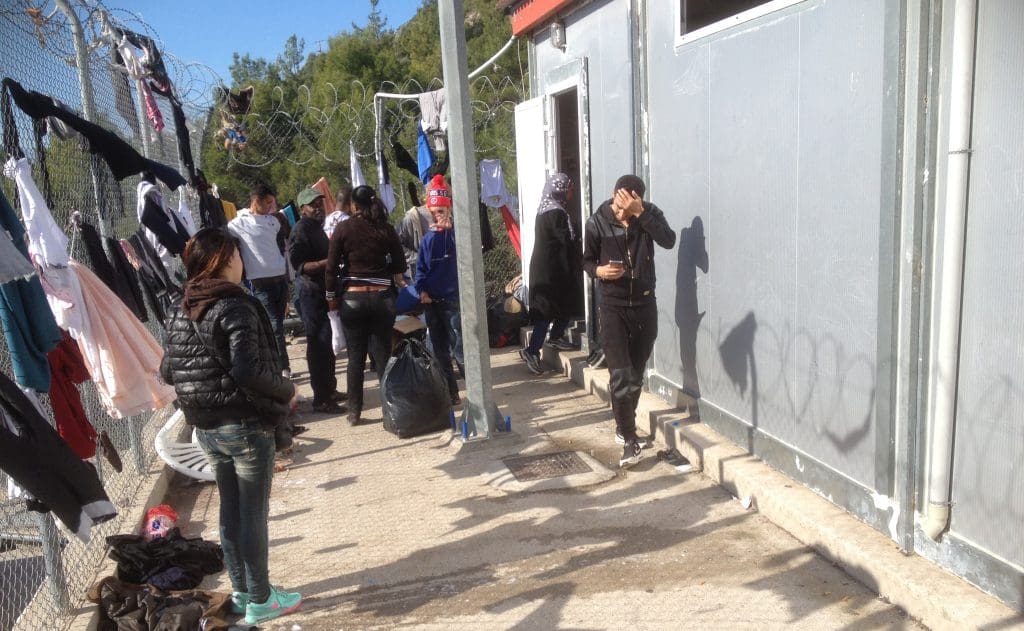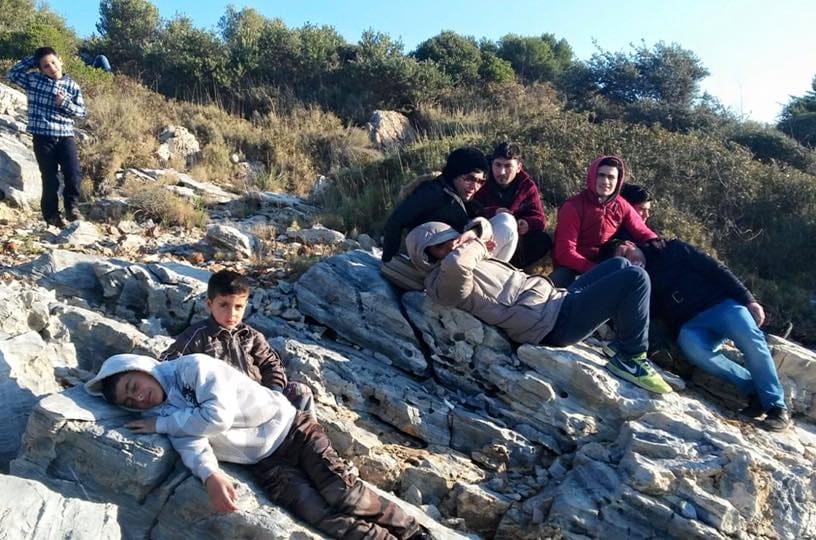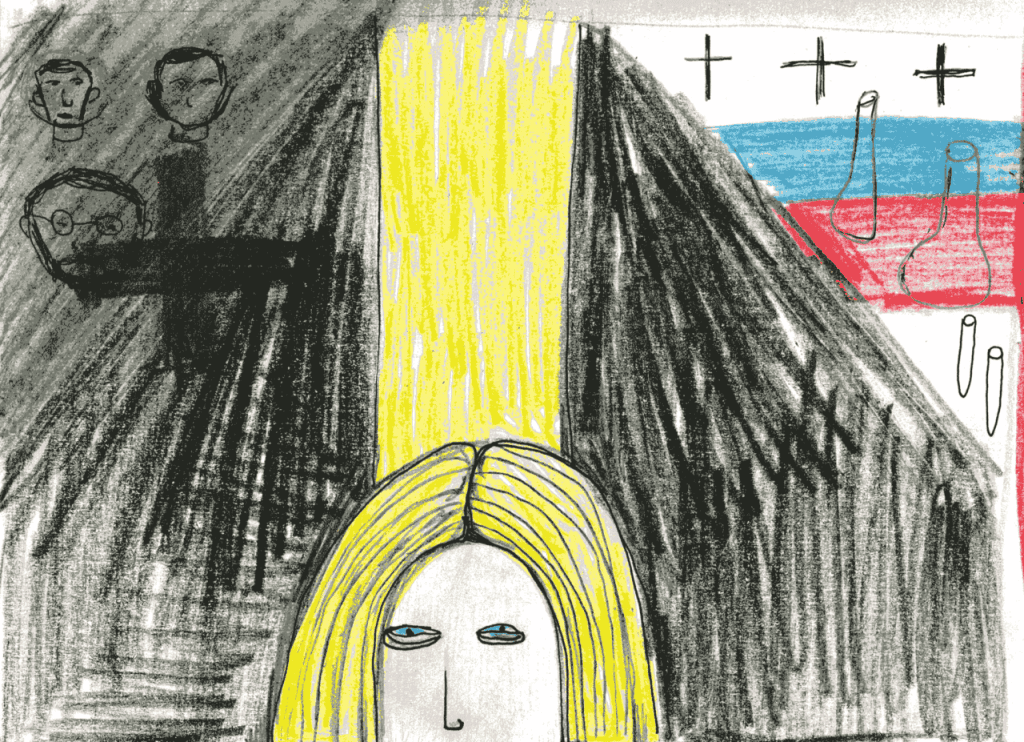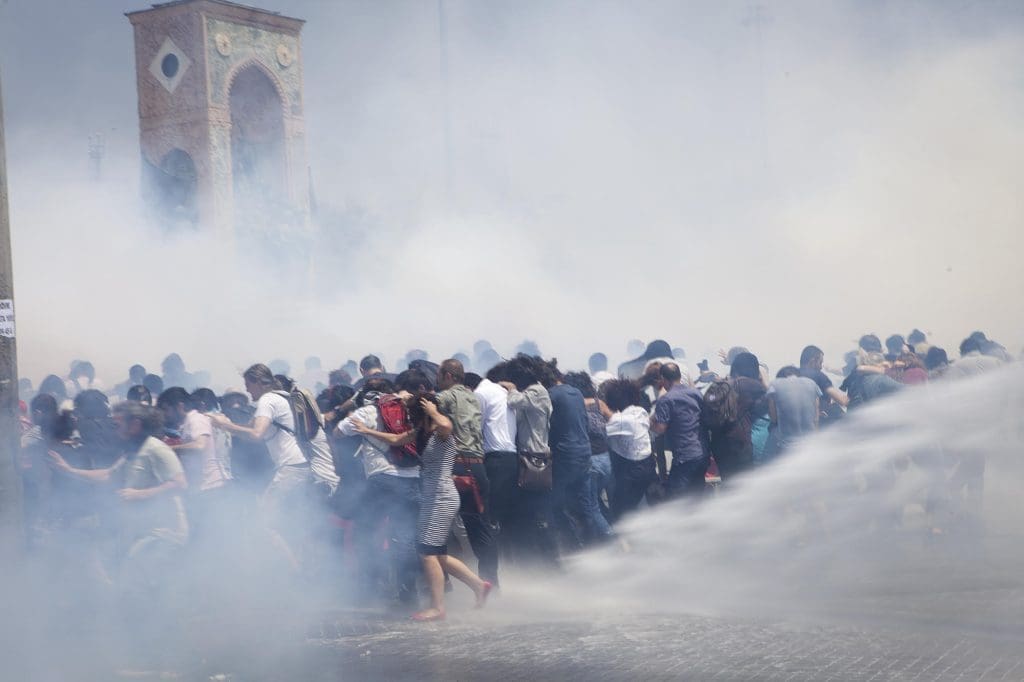AntiNote: Our friends at Samos Chronicles have had a terrible summer. The slow and relentless devastation of the EU-Turkey deal of March 2016 continues its quiet, vicious work, claiming first the sanity and, too often, also the very lives of people caught in border limbo on Greek frontier islands and elsewhere in the hostile space between their hellish former homes and their dreamed-of destinations.
The overcrowded camps of Lesvos and Samos have been back in the news recently as conditions, impossibly, have continued to worsen. People continue to arrive on rafts from Turkey. People who arrived on rafts two years ago “self-deport,” under duress, back to Turkey only to disappear into prison, forced labor, or hopeless, anonymous squalor and exposure. People try to cross the closed, fortified border between Idlib or Afrin and Turkey, and are shot dead by Turkish police. People returning to Syria or Afghanistan, whether by choice or force, are meeting similar fates at the hands of the government or the militants they fled years ago—or at their own despairing hands.
It is hard enough to watch from afar. Now imagine you know and love and care for the people this is happening to. Thankfully there are people like Saad Abdullah and Chris Jones who have the strength and temerity to share their intense and intimate suffering as well as report with brutal honesty on that of those around them. The following is more the latter, but we encourage our readers nonetheless to steel themselves and visit Samos Chronicles for the former, which we could not bring ourselves to reprint. But it’s better to know than to not know.
Fundamentally Flawed: On the Mental Health Crisis of Refugees on Samos
by Chris Jones for Samos Chronicles
24 July 2018 (original post)
Four days ago Ahmad was dumped on again. This time it was a social worker and her assistant who arrived at his house with a young man from Afghanistan. The twenty-three-year-old refugee had taken an overdose. He was completely out of it. Barely able to walk or talk, he had been taken to the hospital, on foot, but according to the social worker there was no psychiatrist there. So they walked to Ahmad’s house and asked him to look after the young guy until the morning, when they would return and take him to the hospital. The social worker said if he should cause any difficulty Ahmad should call the police, who would take him to the cell.
Ahmad is a refugee from Syria who has been on the island for over two years. He is well-known among other refugees and the refugee agencies. He helps out doing many things. The social worker knew that there was a good chance Ahmad would help. As he said, what choice did he have even though he was very unhappy? “If something bad happened to this guy it would be on my shoulders. But if I refused he would be locked in the cell. This would be terrible for him.”
So along with some friends they took him in and tried to settle him down. They made him drink salt water, which made him vomit but “cleaned his stomach,” and they sat with him and made sure he didn’t hurt himself. “He talked as if very drunk and we knew that he was suicidal and desperate. Fortunately by the next morning he felt well enough to go back to his place in the camp. The social worker never returned.”
This was no isolated incident. According to Ahmad, these events are regular. This is not surprising. It was not so long ago that MSF published a damning report on the mental health crisis in the camps on Lesvos and Samos. There can be no disputing that the situation facing the refugees on the frontier islands is profoundly threatening to their physical and mental health. Some can survive the onslaught. Others not, and in a wide variety of ways they turn the inhumanity they experience in on themselves—whether it’s alcohol, drugs, self-harming, erratic behaviors, or paralyzing depression. And as Ahmad notes, it is largely the other refugees who do what they can to support and help those who are suffering.
Not Trusted, Not Competent
I wanted to know more. Much of what Ahmad told me came as no surprise. Despite the epidemic of psychological despair in the Camp there are virtually no services. The psychiatrist in the hospital is overwhelmed, and with few exceptions many of the social workers and psychologists are next to useless. But more importantly, Ahmad said that generally the refugees did not trust these people. They don’t like the fact that the primary medical intervention is tablets – sedatives – even for traumatized young children. Many get thrown away. They see that most of the social workers and psychologists have no understanding either of their culture and backgrounds or the refugee trauma. Above all, Ahmad complained, many of these people show no respect for the religions and beliefs of the refugees. Women refugees with mental health problems were especially vulnerable. He told me that many would never go to seek external help, and suffer out of sight in their tents and containers. Yet again refugees, both women and men, talk of not being able to trust the interpreters, especially in cases of sexual violence and abuse.
These factors alone make the possibility of any effective therapeutic intervention virtually impossible. As far as Ahmad is aware, the welfare workers have had no training or education about how to work with refugees from diverse cultures. Above all, many are simply not up to the job; they simply lack experience. Even the most veteran social workers and psychologists would be challenged by the extreme problems presented by the refugees. But on Samos these welfare workers have neither professional supervision nor are they offered access to welfare workers who are familiar and experienced in dealing with the mental health problems confronting refugees.
Such resources are widely available in the world today, but as Ahmad points out, the camp authorities are not interested. And, he added, they would never think that they might learn something from the refugees themselves who are doing so much to help. In such a context, MSF’s demand to increase psychological resources in the camps is not sufficient without considering the kinds of resources needed. Simply more of the same is not what is needed.
I asked Ahmad how he understood the behaviors of the psychologists and social workers. Why, for example, do they not press for the right kind of support that could help them be more effective? How can a social worker just dump a person clearly in crisis? He thought there were many factors, which varied from individual to individual. There were some, he said, who tried to do their best and were humane and kind. Many more seemed to be confused about their job. As Ahmad rightly notes, psychological reports are used in the asylum process. Many refugees go to a psychologist in the hope they will write a compelling report outlining their traumas and problems, which in turn they hope will positively influence their applications. Just how significant they are is unknown, but this is what the refugees believe. However, Ahmad noted that when refugees go to the psychologist searching for help with their mental health difficulties, some have been told by the psychologist that they cannot help as this is not their job. Their task is to compile reports, not offer treatment.
Most of them, he continued, seem obsessed with ‘the rules.’ They can only do what the rules (whatever they are, as they are never explained) allow. Rules seem to dominate them. They seem scared to challenge in any way, he said. But then again, if the psychologists and social workers are out of their depth and aware of their own shortcomings, it is perhaps not so surprising that they fall back on the rules to justify their role.
Abuse
But as Saad has pointed out, there is one area where some of these workers are prepared to break the rules: sex. He told me many stories of how refugees, both men and women, by agreeing to have sex with a social worker or psychologist, were able to pass through the camp quickly, get their papers, and even be given a good place to stay when they got to Athens. And he said there were also examples where refugees who refused to have sex found themselves facing problems such as being rejected for asylum.
While preparing this article, I discovered that a good friend from Syria who managed to get to Germany clandestinely earlier this year had such an experience. He refused to have sex with the psychologist, and he ended up with two rejections and was facing possible deportation to Turkey. For this reason he was forced to go underground to get out of Samos (he now has asylum in Germany). On reading a draft of this article, Saad replied as follows: “I say thanks again for writing about this. I think many know about this problem but they say nothing. People around the world need to know what is happening to us and how important it is for refugees to have a strong dick or a good body if they want to get asylum and be out of the camp quickly.”
The time has long past for this abusive behavior to be thoroughly investigated and stopped. But as ever, we expect nothing.
There is still a big story to be told about the ‘rules’ framework that dominates refugee policy and practice in Samos and Greece. We know that the Greek state has demanded obedience to its authority from all who are involved with refugees, whether individual volunteers or global NGOs. MSF, when it was on Samos, made all their paid workers sign an incredibly lengthy contract in which they promised at all times to obey the Greek authorities and never to disclose any information arising from their work. Such contracts are the norm here. Obedience is the main precondition for humanitarian involvement. But given the incompetence of the state agencies, why do so many grant them their compliance? It cannot be said that there is no evidence to support the terrible consequences (for the refugees) of their enduring failures. The acceptance of the rules regime almost defies explanation.
It is profoundly disturbing. For example, Ahmad explained that none of the agencies or their workers feel any need to justify their decisions or practices. “All we get told is: That is the rule. No more.” The decisions of the camp manager can never be challenged. She is the boss. “What she says is the law.” The rules regime provides the framework within which power goes unchallenged: no questions are allowed or encouraged. From what Ahmad has observed, too many of the workers are prepared to tolerate this work environment and are all too ready to hide behind the regime of rules. We should not assume that all the workers accept this state of affairs, but sadly we have seen few signs of internal opposition. Interestingly, the police federation has been one of the exceptions, and has periodically complained about the stresses facing their members—such as detaining refugees in the police cell, which is a total horror story.
The kinds of criticism raised by refugees such as Ahmad and Saad are intended to make life better for the refugees, and indeed for those working with them as well. To reach better policies and practices we must in part learn from the mistakes of the current system—from top to bottom. This is why it is so important that those employed in the ‘refugee business’ should find ways to speak out and share their experiences. That they have no whistleblower protections here means that we have to explore and create channels of communication that will offer safety.
Ahmad’s and Saad’s words are important. They remind us that services and interventions which are not appropriate are worse than useless. They remind us that a total reliance on wholly Western psychological/social work practices and theories are also worse than useless and can deepen problems. They remind us that among the refugees there are many talents and human resources which are brought to bear both to understand what they face and to find ways of coping with daily life in and around the camp. They remind us that for all the money spent by the EU to supposedly provide appropriate services for the refugees, it is the refugees themselves who are carrying the burden of the mental health disasters in the camps. And finally, they remind us that where unchallenged authority is exercised in a context of massive inequalities of power, as is the case with refugees and the agencies, abuse of many kinds flourishes.
July 2018
(With thanks to Tony, Ahmad, Saad, Sofiane, Misk, and Mohammad for their help.)
Featured image source: Samos Chronicles





